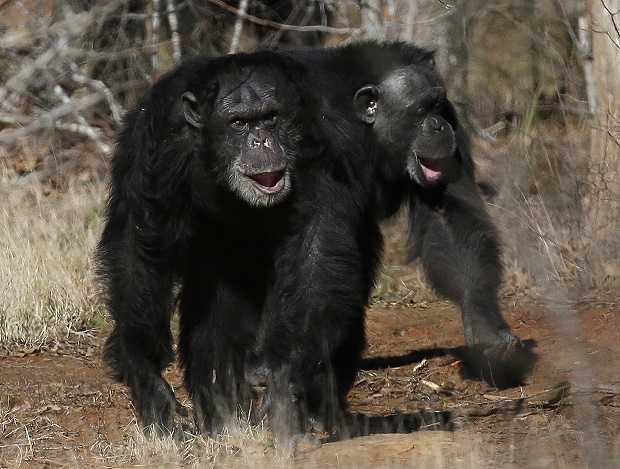Chimps prefer cooperation over competion — study

This Feb. 19, 2013, file photo shows two chimps walking together at Chimp Haven in Keithville, Louisiana. Researchers from the Yerkes National Primate Research Center said studies showed chimpanzees preferred to cooperate than compete in situations presented to the primates . AP FILE
MIAMI, United States — Cooperation is often hailed as a key trait that separates humans from animals, but researchers said Monday that our closest relative, the chimpanzee, can learn to work as a team.
In fact, chimps prefer cooperation by a ratio of five to one over competition, and find ways to discourage peers from freeloading, said the study in the Proceedings of the National Academy of Sciences, a peer-reviewed US journal.
“Given the ratio of conflict to cooperation is quite similar in humans and chimpanzees, our study shows striking similarities across species and gives another insight into human evolution,” said lead author Malini Suchak, who was a graduate student at the Yerkes Research Center in Atlanta, Georgia, at the time of the study.
She is now an assistant professor of animal behavior, ecology and conservation at Canisius College in Buffalo, New York.
Previous studies that found chimps were unlikely to cooperate took place in strictly controlled lab settings.
So researchers at Yerkes National Primate Research Center tried instead to mimic the chimps’ natural environment for this study, placing 11 of them in a grassy outdoor area near a rope-like apparatus they could tug to get treats and rewards.
But they had to work together to get the goods, either in groups of two or three.
Chimps were allowed to choose their own partners.
Though they started out primarily competing against each other, they soon figured out that it was more advantageous to help each other.
Across 94 hour-long test sessions, researchers tallied 3,656 successful cooperative acts.
On the flip side, there were more than 600 competitive interactions, when chimps stole — or tried to steal — rewards without working to get them, pushed others out of the way or started fights.
Chimps sometimes overcame these forms of competition by “directly protesting against others,” said the study.
Or, they refused to work in the presence of a freeloader, a strategy known as “avoidance,” and which humans use, too.
Other times, more dominant chimpanzees intervened to fend off the freeloaders, displaying what researchers called third-party punishment — also a human strategy.
“We gave them the freedom to employ their own enforcement strategies,” said Suchak.
“And it turns out, they are really quite good at preventing competition and favoring cooperation.”
According to co-author Frans de Waal, a primate expert and professor of psychology at Emory University, the study should prompt scientists to reconsider the extent to which cooperation aids survival in the animal world.
“It has become a popular claim in the literature that human cooperation is unique. This is especially curious because the best ideas we have about the evolution of cooperation come straight from animal studies,” he said.
“The natural world is full of cooperation, from ants to killer whales. Our study is the first to show that our closest relatives know very well how to discourage competition and freeloading. Cooperation wins!”